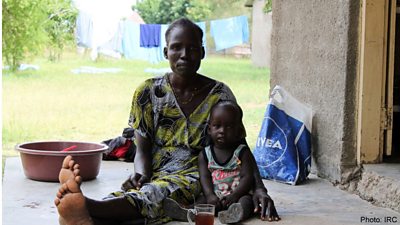A 15-year-old girl in South Sudan has a greater chance of dying in childbirth than of finishing school.
Our Tukul packages interviews, opinion and expert advice from around the country into an entertaining and interactive radio magazine programme.
A tukul in South Sudan is a traditional circular mud dwelling with a thatched roof – the kind of home that is recognisable across the country.
Partnerships for change
Our Tukul is produced by ����ý Media Action’s South Sudan team in English and Simple/Juba Arabic.
Partner radio stations from the Catholic Radio Network are trained to conduct field interviews and to include these back into the programme. The programme is being broadcast nationally in all 10 states in South Sudan.
Maternal mortality
At Independence on 9 July, 2011, South Sudan was one of the world’s poorest countries where 80% of the population live under $1 a day.
According to the United Nations Population Fund, "a 15-year-old girl in South Sudan has a greater chance of dying in childbirth than of finishing school." Maternal mortality is the highest in the world: 2,054 maternal deaths for every 100,000 live births.
In South Sudan, both men and women lack basic knowledge of the benefits of health facilities and there are widespread misconceptions about the value of practices such as breastfeeding babies immediately after birth, attending antenatal care check-ups and using modern contraception.
Language challenges
Like many places in East Africa, radio is the most effective means of reaching people in South Sudan. In a 2007 study by Swiss NGO Fondation Hirondelle, 60% of those surveyed named it as their way of getting news about current events.
Despite fuel shortages, radio remains the only mass medium capable of communicating with a population scattered across a large area.
However, the lack of a single national language presents challenges to using media to reach people. Over 60 different languages are spoken around the country. English is used officially but it is mainly the language of the educated and urban areas.
A simplified version of pidgin Arabic is the most widely understood. This is sometimes referred to as Simple Arabic and is different from Juba Arabic, spoken and understood primarily in the southern states. On the northern fringes of South Sudan, meanwhile, people speak a more classical version of Arabic.
Our Tukul recognises this range in languages by being produced in English and a mix of Simple and Juba Arabic, while partner stations are supported to create spin-off discussion programmes in local languages.
Project information
| Project name | Global Grant: Health |
| Funder | The UK Government's Department for International Development Global Grant Fund |
| Dates | 2011-2016 |
| Themes | Health |
| Outputs | Our Tukul |
| Broadcast partners | 16 partner station inc Catholic Radio Network- CRN, Internews, Radio Jonglei |
| Partners | Supported by the Ministry of Health, South Sudan |
